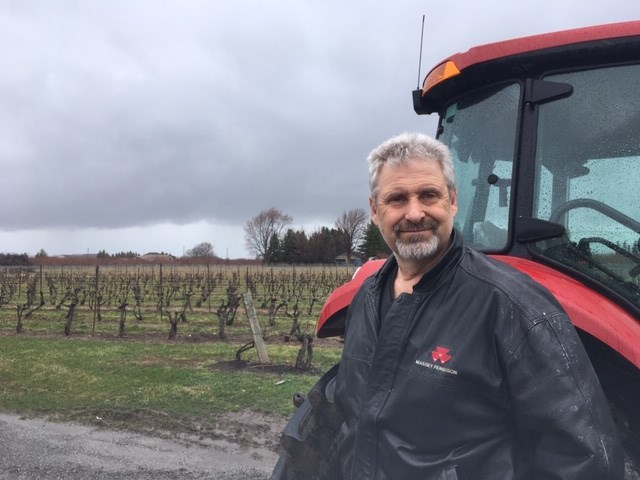
Niagara-on-the-Lake migrant workers remain free of COVID-19, and Coun. Erwin Wiens is doing all he can to ensure that situation continues.
Wiens is a farmer with a small group of seasonal workers, and from the beginning of the pandemic and shutdown of international travel, when farmers were concerned workers might not be admitted to Canada, he has become an advocate for both farmers and workers, and a liaison with the municipality.
He says his biggest worry now is misinformation about workers’ rights.
“They are here on work visas, and they have the same rights as you and I,” he says. “We’re doing the best we can to keep our workers safe. They want to go out, and they have the right to go out, safely. They have the same rights as all of us. The only difference is they live in tight spaces.”
There has been one outbreak in Niagara, and other regions of Ontario.
The recent outbreak at Pioneer Flower Farms in St. Catharines is community-related, believed to have been started by a truck driver from the U.S., although the cause has not been officially determined, says Wiens. In addition to migrant workers, other employees and management have also tested positive.
“It came from the outside. The workers didn’t come here with it,” he says.
“It’s sad what is going on at Pioneer, and in Norfolk County. And two deaths — that’s tragic.”
Although Dr. Mustafa Hirji, Niagara’s acting medical officer of health, is recommending personal protective equipment for migrant workers to reduce the risk of COVID-19, Wiens says he’s not sure how it would help, or where they would get it — even masks remain in short supply.
In order for PPE to have helped in the St. Catharines situation, all employees would have had to be wearing it, he says.
In Niagara, Wiens says he is confident farmers are following all the regulations set out for them when seasonal workers were permitted to enter Canada, which set out protocols regarding health checks, self-isolating, physical distancing, wages, accommodation, and the supplies needed to keep bunkhouses clean.
“Unequivocally, yes, I believe they are. I’m not going physically to the farms, I’m calling and asking them. And I believe that is what is happening,” says Wiens.
A report by a group representing migrant workers is painting a picture of farmers’ failures to sufficiently protect their workers against COVID-19, based on complaints received about housing and working conditions, and other issues.
The report, titled Unheeded Warnings: COVID-19 and Migrant Workers, was released Monday.
The complaints detailed by the Migrant Workers Alliance for Change organization were gathered from workers who had access to phones, and were representing large groups of workers, the report says. They are requesting permanent resident status to give them the rights that other workers have in fighting against unsafe work practices.
In addition to safety issues such as lack of protective equipment, lack of chemicals needed to properly clean their houses, inability to physical distance due to crowded bunkhouses, and problems of isolating and getting food during quarantine periods, there were also complaints about increased workloads and workers being cheated out of their wages.
Issues that have existed for years, the report says, have been even more problematic during the pandemic, leading to sickness, and for two men, death.
The report calls for immediate action to address discrimination and exploitation in Canada’s programs for seasonal workers.
Wiens says every seasonal worker is given a package when they arrive in Canada that provides information in their own language, and numbers for them to call to report problems.
He strongly resents the “damning accusations” by the Migrant Workers Alliance for Change, he says.
“This is the issue. Everyone knows I will fight for everything I think is right. But there is nobody to go after.”
Everything in the report is anonymous, says Wiens. There are no farms, no names or addresses, just a lot of serious allegations with no way to follow up on them. If the group wants action, it should go to the various liaison offices, the police, or the Ministry of Health, he says.
The workers themselves have the same rights as everybody else, and if they are being mistreated, “we as a community, as a society, will look after them. But we need to know who they are. These anonymous complaints are very disheartening. How can I help you if I don’t know who you are?”
If the workers’ alliance doesn’t want to share that information, then it has to make complaints on behalf of the workers, says Wiens.
“Releasing it to the media isn’t getting it done. I don’t have the answers. Give me the information I need to fight for them.”
It’s frustrating, says Wiens, to have that information out there, “and I can’t do anything with it.”
During his update to councillors Monday, Wiens says the outbreak of COVID-19 is not a migrant workers issue, it’s an agricultural issue, similar to any business where people are working in confined spaces.
He told councillors the seasonal employees have the same rights as anyone living and working in Canada, including being eligible for employment insurance, the Canada Pension Plan, and health benefits.
Every worker is being contacted on a daily basis to make sure they’re safe and healthy, and there is a protocol in place for isolation and medical attention, he says.
“If there are some bad actors, there is no place for that in the industry, full stop.”
If anyone is aware of issues, he asked that they come forward, “so we can keep everybody safe, which is important for the workers, the food chain and employers.”